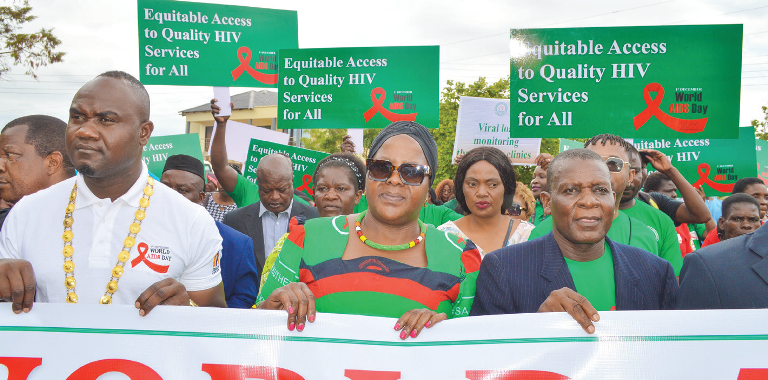Malawi attains epidemic control levels for HIV
Malawi on Thursday joined the global community in commemorating World Aids Day with news of its attainment of epidemic control levels following continued success in the National HIV and Aids Response.
Attainment of epidemic control level is when the number of new HIV infections is lower the number of deaths among HIV-infected individuals.

Presiding over the commemoration in Blantyre, Minister of Health Khumbize Kandodo Chiponda expressed excitement with reports that Malawi has surpassed the United Nations Aids Agency (UNAids) 95-95- 95 HIV epidemic control targets ahead of the deadline in June 2025.
The latest statistics show that Malawi is now at 94:99:95, meaning that 94 percent of all people with HIV are aware of their status, 99 percent of those aware of their status are on antiretroviral (ARV) therapy and 95 percent of those on antiretroviral treatment have achieved viral load suppression.
The minister said: “However, while we celebrate these excellent results, recently, we have seen an increase in HIV infection among young men aged 25-34 years. This is worrisome considering that this age group is key for national development.”
Kandodo-Chiponda attributed the challenges in the aforementioned groups to social, cultural and economic factors, limited access to sexual and reproductive health rights, gender-based violence and sexual harassment.
Statistics from the National Aids Commission (NAC) show that Malawi has reduced new HIV infections by 69 percent from 56 000 in 2010 to 17 400 in 2022 and by June 2022, there were cumulatively 927 478 people diagnosed HIV-positive.
Malawi has also managed to reduce Aids-related deaths from 32 000 in 2010 to 9 511 in 2022.
The minister was upbeat that Malawi will attain its target of eliminating new HIV infections by 2030.
In his remarks, Phia project global director David Hoos called for more attention to children born with HIV, saying statistics are showing that Malawi is losing more babies to HIV and Aids.
The Malawi Network of Aids Service Organisations (Manaso) board chairperson Maziko Matemba called on partners to increase resources toward prevention services. government and development
“HIV new infection rate is still high, putting more resources to HIV prevention and providing HIV services and treating everyone equally and fairly is one way that can assist to end the pandemic,” he said.
World Aids Day was set aside by the World Health Organisation to bring together all people around the world to raise awareness about the HIV and Aids prevention, treatment, care and support. The day was commemorated under theme ‘Equitable access to quality HIV services for all’.





